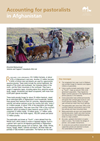The rangelands that cover much of Afghanistan provide forage for livestock and support millions of pastoralists. Fully or partly nomadic pastoralists, known as “Kuchi”, make up around 10% of Afghanistan’s population. They migrate between summer pastures in the highlands and winter pastures in the lowlands. Some pastoralists have settled permanently and graze their animals year-round on communal pastures nearby. Others no longer own animals but retain their Kuchi identity. The pastoralists own more than 70% of the country’s livestock and produce most of the live animals and meat consumed there. Many pastoralists are poor and marginalized, lacking education, health and other services. Securing access to their traditional grazing lands is a major problem. Accurate, updated information on pastoralism is scarce. This hinders the design of policies and suitable interventions. A conducive socio-political environment and supportive policies are essential to ensure the sustainability of pastoralism.

Download document
